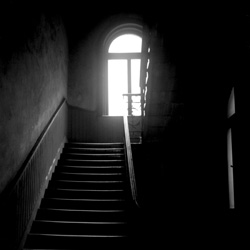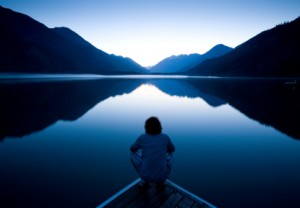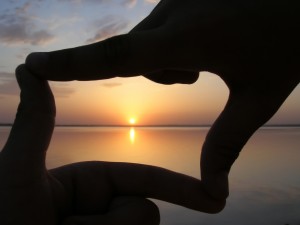I’m struck by how many people these days believe they can create their own reality, despite overwhelming evidence to the contrary. It’s become a national pastime in narcissistic America, and the results are in—the cultural reality has become unbearable to anyone who still has the eyes to see and heart to feel.
 Of course, the motivation to create your own personal reality arises from the need to escape the collective reality that surrounds you. This reality (the world as it is) isn’t the only one possible, but it is the one that is, and we have to understand it, and not run away into some delusion of personal reality if we’re going to transcend and move beyond it, individually and collectively.
Of course, the motivation to create your own personal reality arises from the need to escape the collective reality that surrounds you. This reality (the world as it is) isn’t the only one possible, but it is the one that is, and we have to understand it, and not run away into some delusion of personal reality if we’re going to transcend and move beyond it, individually and collectively.
Perhaps the most important distinction a person can make is between reality and actuality. However most people don’t even perceive reality (as evidenced by the juvenile idea that we can each create our own), much less perceive actuality.
But the distinction without duality is clear when you stop and look at things, and it can and must be taught even to young children. Reality is the world as man (more kindly, humankind) generates it; actuality is the infinite realm beyond what the human mind internally and externally fabricates.
Contact and communion with nature is so important because nature is the primordial manifestation of actuality—the awe-inspiring dimensions of life that aren’t man-made.
We’re continually surrounded by the fabrications of the human mind, tactile and virtual, and are embedded in them so deeply that few people are aware of the conditioned way they perceive nature and the world. Indeed, many people assume there is nothing beyond the reality that the human mind fabricates. They view nature as chaos, upon which man must impose order. But life on earth is an expression of the dynamic order of the universe, and man is the maker of disorder.
It’s an interesting word, ‘fabricate.’ It comes from the Latin ‘fabricatus,’ and means both ‘to invent,’ and ‘to make up for the purpose of deception.’ The inherent tendency of the human mind toward self-deception has its roots in its ability to devise things, from cultural and religious systems to the most complex computers (which in turn are increasingly captivating us in ‘virtual reality’).
In one sense, humans have always lived in ‘virtual reality,’ since cultures form the prisms through which we have viewed nature and life. However, culture in the geographically distinct, anthropological sense of the word has nearly vanished, and we cannot return to the past in any form, but must look forward as human beings. So it’s no use romanticizing prior periods in human history, when people lived close to nature.
nature and life. However, culture in the geographically distinct, anthropological sense of the word has nearly vanished, and we cannot return to the past in any form, but must look forward as human beings. So it’s no use romanticizing prior periods in human history, when people lived close to nature.
Is it possible not to view life through the lens of tradition and experience, knowledge and memory? What would a culture founded on such a principle look like?
One of the features of ‘higher thought’ is that it’s unable to perceive itself and its limitations. That requires awareness, which is not a faculty of ‘higher thought.’ Being creatures of conditioning, many people believe, at a conscious or subconscious level, that thought is all there is. In the dominant worldview, nature and the cosmos are seen as disorder, upon which man must superimpose order.
But actually the universe or universes are infinitely layered dimensions of order, and though man has come to dominate nature on earth, increasingly our order is disorder and darkness. (Even more so when people believe they can create their own personal reality.) Control of nature is woven so deeply into our psyches that many people see no other relationship to the earth and others than one based on control. But that isn’t relationship at all.
Communion with nature on its own terms, without the screen of knowledge, tradition, and experience is viewed as romantic, personal, and even childish. But giving the human intellect and rationality the highest value erodes emotional and spiritual capacity, eventually leaving only sentimentality, which is virtual emotion.
 Control is the ultimate illusion. Man thinks because he can dominate nature to a large degree that he has control of nature, and life. But we don’t actually have control over anything.
Control is the ultimate illusion. Man thinks because he can dominate nature to a large degree that he has control of nature, and life. But we don’t actually have control over anything.
Given the man-made reality of climate change, or more accurately man’s disruption in the dynamic balance of the atmosphere and oceans, ‘superstorms’ like Sandy are nature’s way of coming back and biting us in the ass.
Humankind faces not just fundamental economic and political choices, unprecedented in the history and evolution of our species, but we stand at an existential and evolutionary crossroads. Either we actively seek balance with nature, or nature will restore balance with a vengeance.
We need to completely rethink the relationship between man and nature, between reality and actuality, and bring about a transmutation in consciousness and culture. That urgent imperative of life to radically change is as far from the relativist’s credo of ‘create your own reality’ as the soaring cliffs of Yosemite Valley are from the abysmal canyons of Wall Street.
Anyone who has spent a few nights in the wilderness alone learns two things at an emotional level: Nature doesn’t give a whit about your personal survival; and all scientific knowledge and cultural tradition are a thin veneer on an unknowable and uncontrollable movement of life and death. Strip away the veneer, and one comes face to face with a mystery and immensity that scares the bejesus of most people.
However, life is not some freak accident in a meaningless cosmos, but an inseparable expression of the endless and sublime process of creation and destruction in the universe. Therefore the actuality of nature and the cosmos is nothing to fear, since it is the perpetual ground of human creativity.
And the relationship, indeed dialogue between humankind’s reality and cosmic actuality, between the infinite mystery of life and the civilizing insight of aspiring human beings—is the uncharted way ahead, holding the potential to redefine humanity’s place on this planet.
Martin LeFevre

